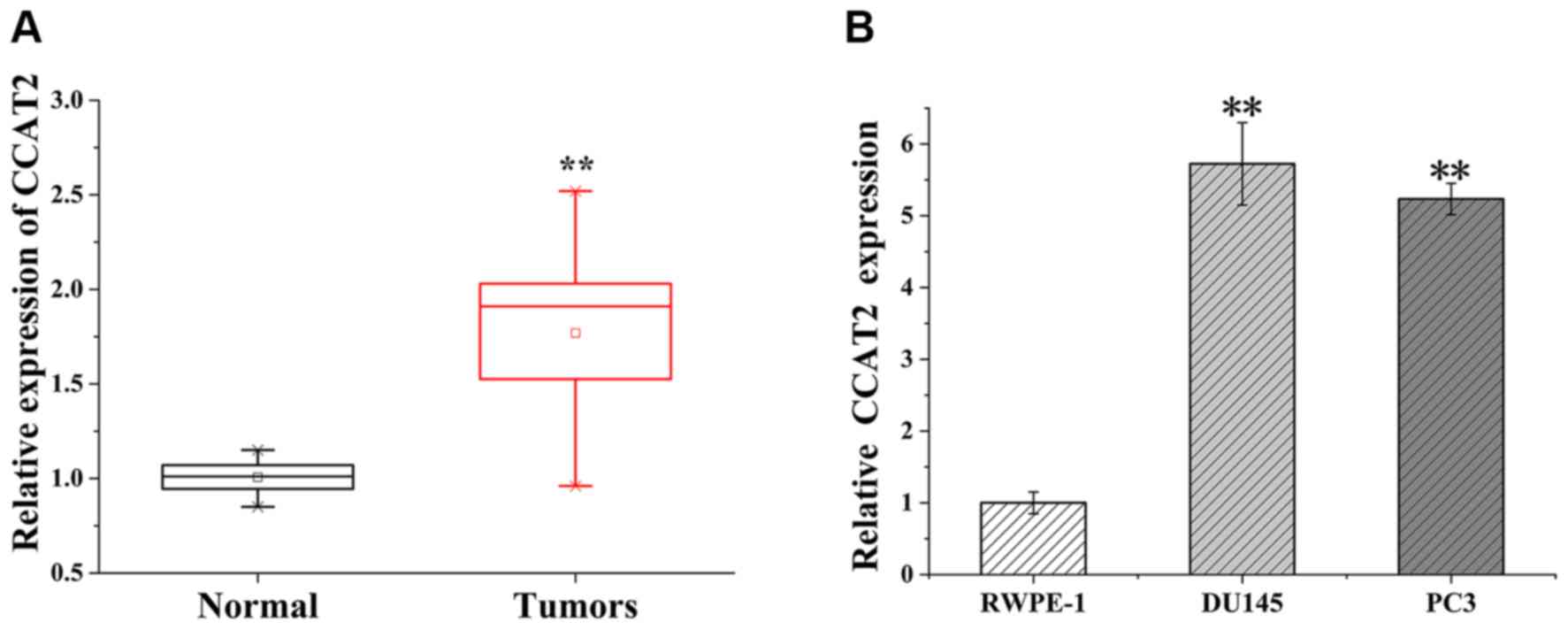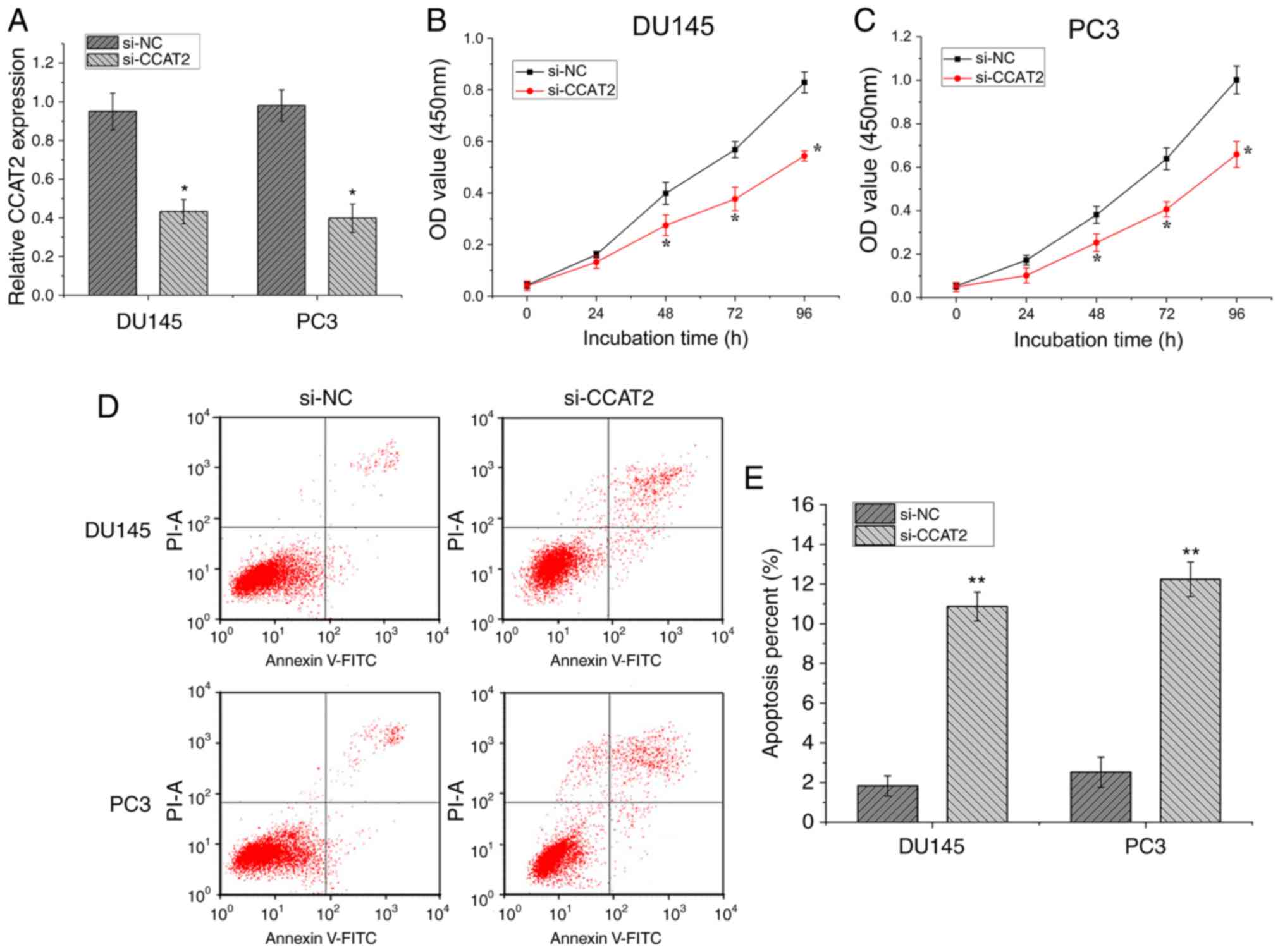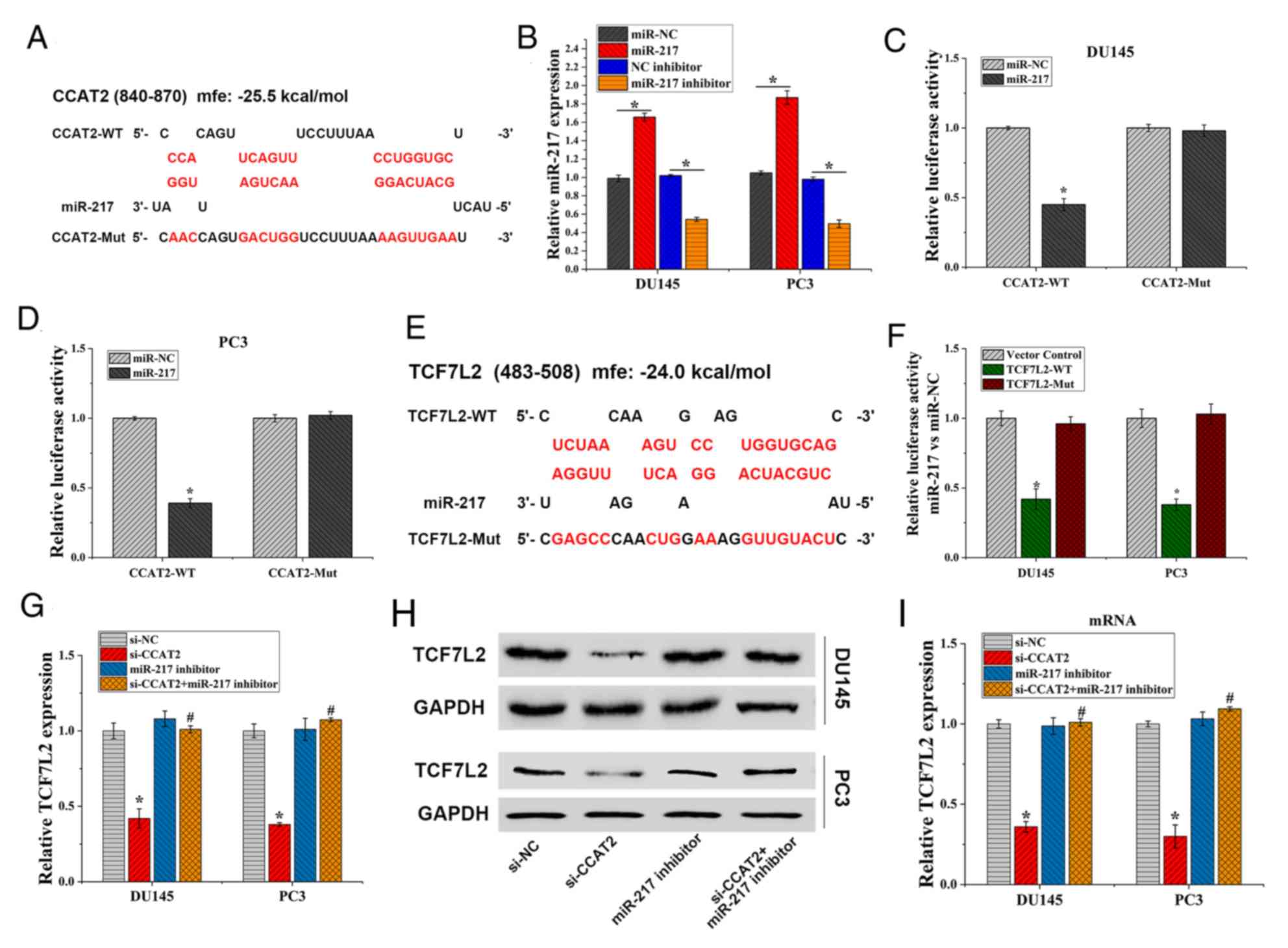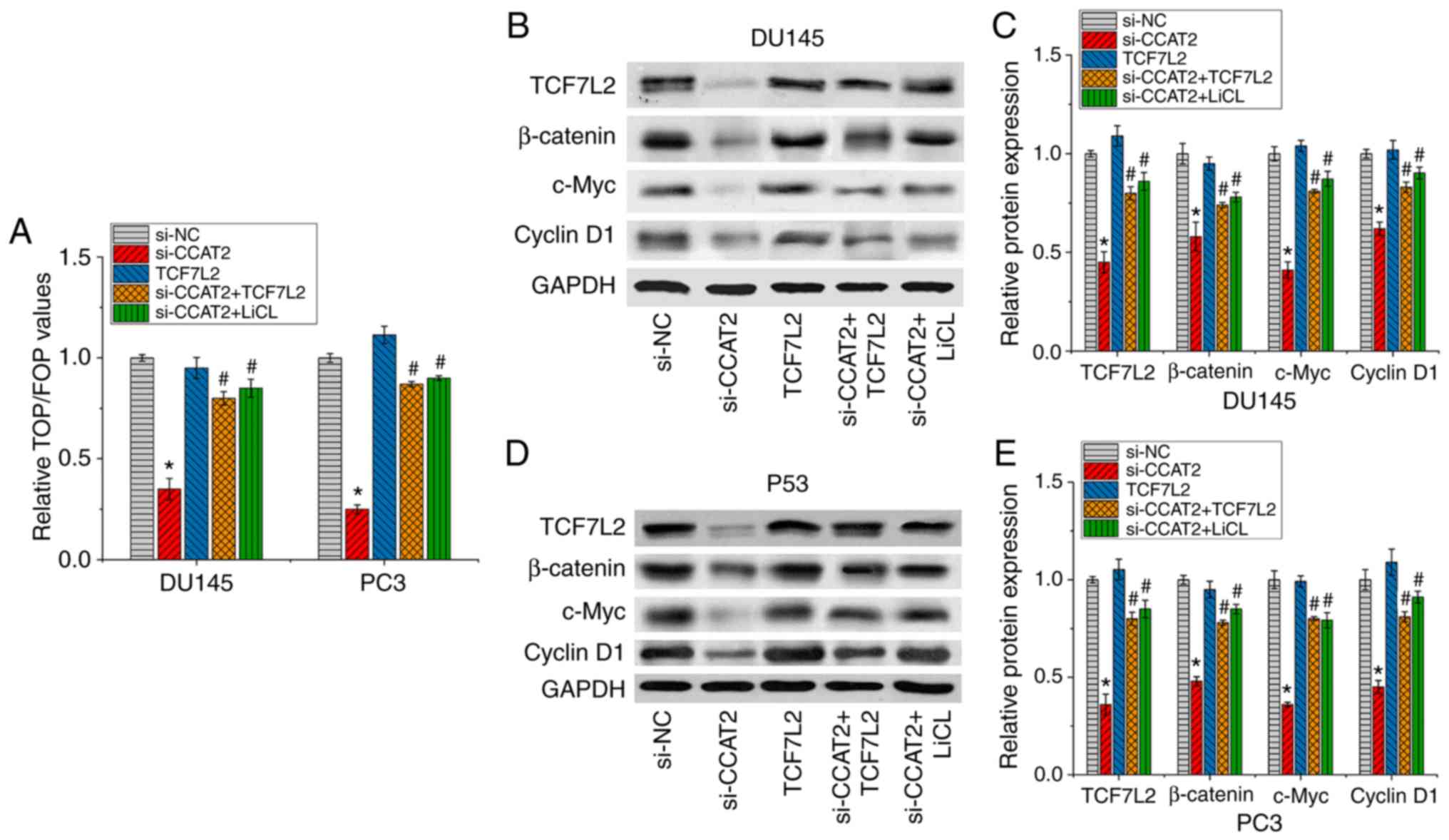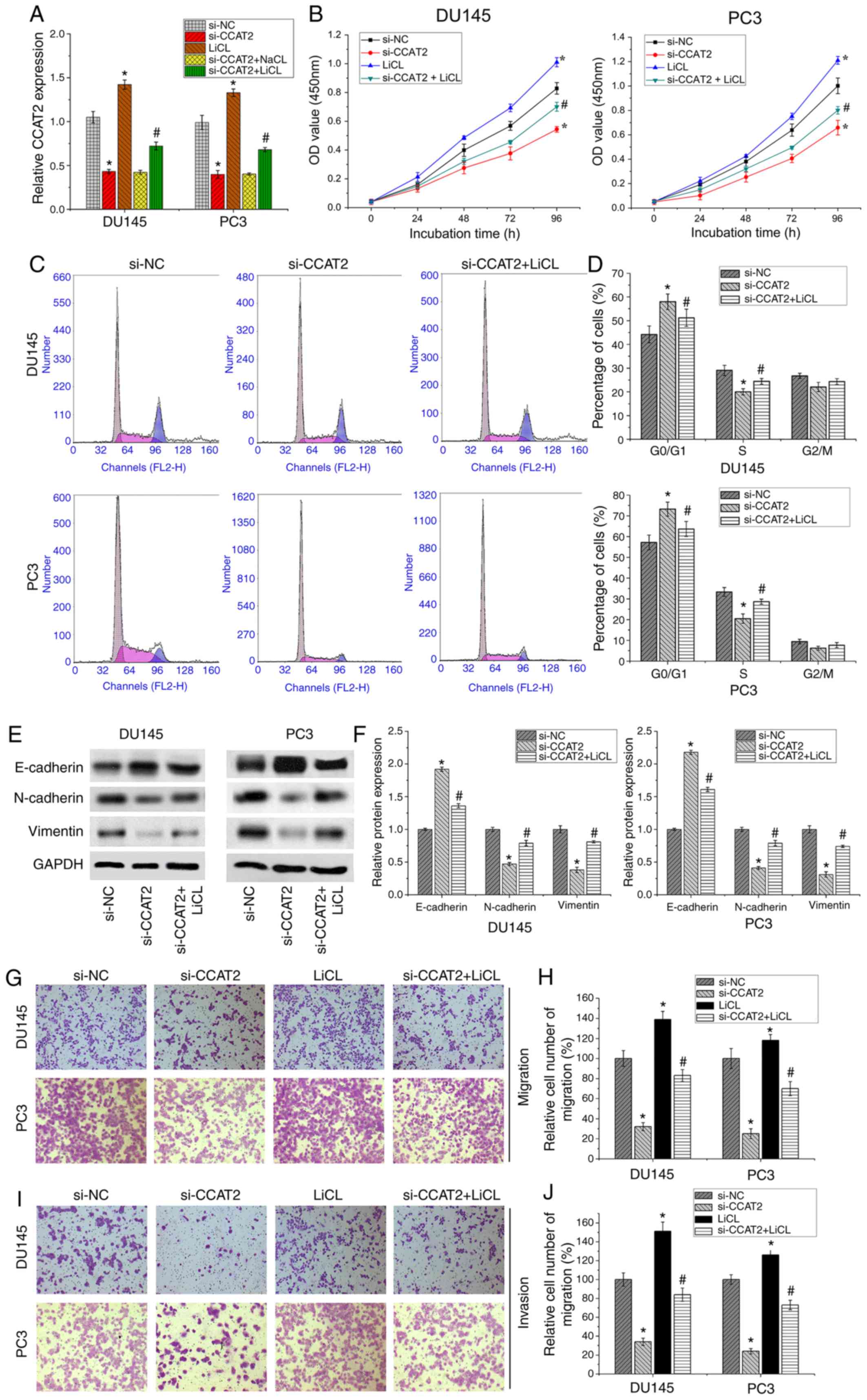|
1
|
Siegel RL, Miller KD and Jemal A: Cancer
statistics, 2016. CA Cancer J Clin. 66:7–30. 2016. View Article : Google Scholar : PubMed/NCBI
|
|
2
|
Siegel RL, Miller KD and Jemal A: Cancer
statistics, 2019. CA Cancer J Clin. 69:7–34. 2019. View Article : Google Scholar : PubMed/NCBI
|
|
3
|
Chen W, Zheng R, Baade PD, Zhang S, Zeng
H, Bray F, Jemal A, Yu XQ and He J: Cancer statistics in China,
2015. CA Cancer J Clin. 66:115–132. 2016. View Article : Google Scholar : PubMed/NCBI
|
|
4
|
Logothetis C, Morris MJ, Den R and Coleman
RE: Current perspectives on bone metastases in castrate-resistant
prostate cancer. Cancer Metastasis Rev. 37:189–196. 2018.
View Article : Google Scholar : PubMed/NCBI
|
|
5
|
Frieling JS, Basanta D and Lynch CC:
Current and emerging therapies for bone metastatic
castration-resistant prostate cancer. Cancer Contr. 22:109–120.
2015. View Article : Google Scholar
|
|
6
|
Zhu Z, Zhang H, Lang F, Liu G, Gao D, Li B
and Liu Y: Pin1 promotes prostate cancer cell proliferation and
migration through activation of Wnt/β-catenin signaling. Clin
Transl Oncol. 18:792–797. 2016. View Article : Google Scholar : PubMed/NCBI
|
|
7
|
Zhu LF, Song LD, Xu Q and Zhan JF: Highly
expressed long non-coding RNA FEZF1-AS1 promotes cells
proliferation and metastasis through Notch signaling in prostate
cancer. Eur Rev Med Pharmacol Sci. 23:5122–5132. 2019.PubMed/NCBI
|
|
8
|
Feldman BJ and Feldman D: The development
of androgen-independent prostate cancer. Nat Rev Cancer. 1:34–45.
2001. View
Article : Google Scholar : PubMed/NCBI
|
|
9
|
Crea F, Clermont PL, Parolia A, Wang Y and
Helgason CD: The non-coding transcriptome as a dynamic regulator of
cancer metastasis. Cancer Metastasis Rev. 33:1–16. 2014. View Article : Google Scholar : PubMed/NCBI
|
|
10
|
Viereck J and Thum T: Circulating
noncoding RNAs as biomarkers of cardiovascular disease and injury.
Circ Res. 120:381–399. 2017. View Article : Google Scholar : PubMed/NCBI
|
|
11
|
Meseure D, Drak Alsibai K, Nicolas A,
Bieche I and Morillon A: Long noncoding RNAs as new architects in
cancer epigenetics, prognostic biomarkers, and potential
therapeutic targets. BioMed Res Int. 2015:3202142015. View Article : Google Scholar : PubMed/NCBI
|
|
12
|
Chen X, Lu X, Chen J, Wu D, Qiu F, Xiong
H, Pan Z, Yang L, Yang B, Xie C, et al: Association of nsv823469
copy number loss with decreased risk of chronic obstructive
pulmonary disease and pulmonary function in Chinese. Sci Rep.
7:400602017. View Article : Google Scholar : PubMed/NCBI
|
|
13
|
Wang CY, Hua L, Yao KH, Chen JT, Zhang JJ
and Hu JH: Long non-coding RNA CCAT2 is up-regulated in gastric
cancer and associated with poor prognosis. Int J Clin Exp Pathol.
8:779–785. 2015.PubMed/NCBI
|
|
14
|
Zhao Z, Wang J, Wang S, Chang H, Zhang T
and Qu J: LncRNA CCAT2 promotes tumorigenesis by over-expressed
Pokemon in non-small cell lung cancer. Biomed Pharmacother.
87:692–697. 2017. View Article : Google Scholar : PubMed/NCBI
|
|
15
|
Zhao C, Qiao C, Zong L and Chen Y: Long
non-coding RNA-CCAT2 promotes the occurrence of non-small cell lung
cancer by regulating the Wnt/β-catenin signaling pathway. Oncol
Lett. 16:4600–4606. 2018.PubMed/NCBI
|
|
16
|
Wang J, Qiu M, Xu Y, Li M, Dong G, Mao Q,
Yin R and Xu L: Long noncoding RNA CCAT2 correlates with smoking in
esophageal squamous cell carcinoma. Tumour Biol. 36:5523–5528.
2015. View Article : Google Scholar : PubMed/NCBI
|
|
17
|
Wang X and Wang X: Long non-coding RNA
colon cancer-associated transcript 2 may promote esophageal cancer
growth and metastasis by regulating the Wnt signaling pathway.
Oncol Lett. 18:1745–1754. 2019.PubMed/NCBI
|
|
18
|
Wu ER, Hsieh MJ, Chiang WL, Hsueh KC, Yang
SF and Su SC: Association of lncRNA CCAT2 and CASC8 gene
polymorphisms with hepatocellular carcinoma. Int J Environ Res
Public Health. 16:162019.
|
|
19
|
Liu Y, Wang D, Li Y, Yan S, Dang H, Yue H,
Ling J, Chen F, Zhao Y, Gou L, et al: Long noncoding RNA CCAT2
promotes hepatocellular carcinoma proliferation and metastasis
through up-regulation of NDRG1. Exp Cell Res. 379:19–29. 2019.
View Article : Google Scholar : PubMed/NCBI
|
|
20
|
Wu L, Jin L, Zhang W and Zhang L: Roles of
long non-coding RNA CCAT2 in cervical cancer cell growth and
apoptosis. Med Sci Monit. 22:875–879. 2016. View Article : Google Scholar : PubMed/NCBI
|
|
21
|
Li J, Zhuang C, Liu Y, Chen M, Zhou Q,
Chen Z, He A, Zhao G, Guo Y, et al: shRNA targeting long non-coding
RNA CCAT2 controlled by tetracycline-inducible system inhibits
progression of bladder cancer cells. Oncotarget. 7:28989–28997.
2016. View Article : Google Scholar : PubMed/NCBI
|
|
22
|
Liu J, Kong D, Sun D and Li J: Long
non-coding RNA CCAT2 acts as an oncogene in osteosarcoma through
regulation of miR-200b/VEGF. Artif Cells Nanomed Biotechnol.
47:2994–3003. 2019. View Article : Google Scholar : PubMed/NCBI
|
|
23
|
Ling H, Spizzo R, Atlasi Y, Nicoloso M,
Shimizu M, Redis RS, Nishida N, Gafà R, Song J, Guo Z, et al:
CCAT2, a novel noncoding RNA mapping to 8q24, underlies metastatic
progression and chromosomal instability in colon cancer. Genome
Res. 23:1446–1461. 2013. View Article : Google Scholar : PubMed/NCBI
|
|
24
|
Zheng J, Zhao S, He X, Zheng Z, Bai W,
Duan Y, Cheng S, Wang J, Liu X and Zhang G: The up-regulation of
long non-coding RNA CCAT2 indicates a poor prognosis for prostate
cancer and promotes metastasis by affecting epithelial-mesenchymal
transition. Biochem Biophys Res Commun. 480:508–514. 2016.
View Article : Google Scholar : PubMed/NCBI
|
|
25
|
Ren X, Zhu R, Liu G, Xue F, Wang Y, Xu J,
Zhang W, Yu W and Li R: Effect of sitagliptin on tubulointerstitial
Wnt/β-catenin signalling in diabetic nephropathy. Nephrology
(Carlton). 24:1189–1197. 2019. View Article : Google Scholar : PubMed/NCBI
|
|
26
|
Tian FM, Meng FQ and Wang XB:
Overexpression of long-noncoding RNA ZFAS1 decreases survival in
human NSCLC patients. Eur Rev Med Pharmacol Sci. 20:5126–5131.
2016.PubMed/NCBI
|
|
27
|
Kasagi Y, Oki E, Ando K, Ito S, Iguchi T,
Sugiyama M, Nakashima Y, Ohgaki K, Saeki H, Mimori K, et al: The
expression of CCAT2, a novel long noncoding RNA transcript, and
rs6983267 single-nucleotide polymorphism genotypes in colorectal
cancers. Oncology. 92:48–54. 2017. View Article : Google Scholar : PubMed/NCBI
|
|
28
|
Lyu X, Li J, Yun X, Huang R, Deng X, Wang
Y, Chen Y and Xiao G: miR-181a-5p, an inducer of Wnt-signaling,
facilitates cell proliferation in acute lymphoblastic leukemia.
Oncol Rep. 37:1469–1476. 2017. View Article : Google Scholar : PubMed/NCBI
|
|
29
|
Xiao L, Chen Y, Yuan Y, Xu B, Gao Q, Chen
P, Zhang T and Guan T: PC-1 NF suppresses high glucose-stimulated
inflammation and extracellular matrix accumulation in glomerular
mesangial cells via the Wnt/β-catenin signaling. Exp Ther Med.
18:2029–2036. 2019.PubMed/NCBI
|
|
30
|
Chen JJ, Xiao ZJ, Meng X, Wang Y, Yu MK,
Huang WQ, Sun X, Chen H, Duan YG, Jiang X, et al: MRP4 sustains
Wnt/β-catenin signaling for pregnancy, endometriosis and
endometrial cancer. Theranostics. 9:5049–5064. 2019. View Article : Google Scholar : PubMed/NCBI
|
|
31
|
Rothe M, Kanwal N, Dietmann P, Seigfried
FA, Hempel A, Schütz D, Reim D, Engels R, Linnemann A, Schmeisser
MJ, et al: An Epha4/Sipa1l3/Wnt pathway regulates eye development
and lens maturation. Development. 144:321–333. 2017. View Article : Google Scholar : PubMed/NCBI
|
|
32
|
Chopra S, Al-Sammarraie N, Lai Y and Azhar
M: Increased canonical WNT/β-catenin signalling and myxomatous
valve disease. Cardiovasc Res. 113:6–9. 2017. View Article : Google Scholar : PubMed/NCBI
|
|
33
|
Ma Y, Hu X, Shang C, Zhong M and Guo Y:
Silencing of long non-coding RNA CCAT2 depressed malignancy of oral
squamous cell carcinoma via Wnt/β-catenin pathway. Tumour Biol.
39:10104283177176702017. View Article : Google Scholar : PubMed/NCBI
|
|
34
|
Wang B, Liu M, Zhuang R, Jiang J, Gao J,
Wang H, Chen H, Zhang Z, Kuang Y and Li P: Long non-coding RNA
CCAT2 promotes epithelial-mesenchymal transition involving
Wnt/β-catenin pathway in epithelial ovarian carcinoma cells. Oncol
Lett. 15:3369–3375. 2018.PubMed/NCBI
|
|
35
|
Guo H, Hu G, Yang Q, Zhang P, Kuang W, Zhu
X and Wu L: Knockdown of long non-coding RNA CCAT2 suppressed
proliferation and migration of glioma cells. Oncotarget.
7:81806–81814. 2016. View Article : Google Scholar : PubMed/NCBI
|
|
36
|
Sarrafzadeh S, Geranpayeh L, Tasharrofi B,
Soudyab M, Nikpayam E, Iranpour M, Mirfakhraie R, Gharesouran J
Ghafouri-Fard S and Ghafouri-Fard S: Expression study and clinical
correlations of MYC and CCAT2 in breast cancer patients. Iran
Biomed J. 21:303–311. 2017. View Article : Google Scholar : PubMed/NCBI
|
|
37
|
Huang JL, Liao Y, Qiu MX, Li J and An Y:
Long non-coding RNA CCAT2 promotes cell proliferation and invasion
through regulating Wnt/β-catenin signaling pathway in clear cell
renal cell carcinoma. Tumour Biol. 39:1010428317711312017.
View Article : Google Scholar
|
|
38
|
Livak KJ and Schmittgen TD: Analysis of
relative gene expression data using real-time quantitative PCR and
the 2(−ΔΔC(T)) Method. Methods. 25:402–408. 2001. View Article : Google Scholar : PubMed/NCBI
|
|
39
|
Rehmsmeier M, Steffen P, Hochsmann M and
Giegerich R: Fast and effective prediction of microRNA/target
duplexes. RNA. 10:1507–1517. 2004. View Article : Google Scholar : PubMed/NCBI
|
|
40
|
Teo JL and Kahn M: The Wnt signaling
pathway in cellular proliferation and differentiation: A tale of
two coactivators. Adv Drug Deliv Rev. 62:1149–1155. 2010.
View Article : Google Scholar : PubMed/NCBI
|
|
41
|
Hrckulak D, Kolar M, Strnad H and Korinek
V: TCF/LEF transcription factors: An update from the internet
resources. Cancers (Basel). 8:182016. View Article : Google Scholar
|
|
42
|
Liu Z and Habener JF: Stromal cell-derived
factor-1 promotes survival of pancreatic beta cells by the
stabilisation of beta-catenin and activation of transcription
factor 7-like 2 (TCF7L2). Diabetologia. 52:1589–1598. 2009.
View Article : Google Scholar : PubMed/NCBI
|
|
43
|
Zheng A, Song X, Zhang L, Zhao L, Mao X,
Wei M and Jin F: Long non-coding RNA LUCAT1/miR-5582-3p/TCF7L2 axis
regulates breast cancer stemness via Wnt/β-catenin pathway. J Exp
Clin Cancer Res. 38:3052019. View Article : Google Scholar : PubMed/NCBI
|
|
44
|
Cai Q, Wang Z, Wang S, Weng M, Zhou D, Li
C, Wang J, Chen E and Quan Z: Long non-coding RNA LINC00152
promotes gallbladder cancer metastasis and epithelial-mesenchymal
transition by regulating HIF-1α via miR-138. Open Biol. 7:72017.
View Article : Google Scholar
|
|
45
|
Ji J, Tang J, Deng L, Xie Y, et al:
LINC00152 promotes proliferation in hepatocellular carcinoma by
targeting EpCAM via the mTOR signaling pathway. Oncotarget.
6:42813–42824. 2015. View Article : Google Scholar : PubMed/NCBI
|
|
46
|
Meryet-Figuière M, Lambert B, Gauduchon P,
et al: An overview of long non-coding RNAs in ovarian cancers.
7:44719–44734. 2016.PubMed/NCBI
|
|
47
|
Ling H, Spizzo R, Atlasi Y, et al: CCAT2,
a novel noncoding RNA mapping to 8q24, underlies metastatic
progression and chromosomal instability in colon cancer. Genome
Res. 23:1446–1461. 2013. View Article : Google Scholar : PubMed/NCBI
|
|
48
|
Xin Y, Li Z, Zheng H, Chan MTV and Ka Kei
Wu W: CCAT2: A novel oncogenic long non-coding RNA in human
cancers. Cell Prolif. 50:e123422017. View Article : Google Scholar
|
|
49
|
Wu SW, Hao YP, Qui JH, Zhang DB, Yu CG and
Li WH: High expression of long noncoding RNA CCAT2 indicates poor
prognosis of gastric cancer and promotes cell proliferation and
invasion. Minerva Med. 108:317–323. 2017.PubMed/NCBI
|
|
50
|
Cai Y, He J and Zhang D: Long noncoding
RNA CCAT2 promotes breast tumor growth by regulating the Wnt
signaling pathway. Onco Targets Ther. 8:2657–2664. 2015.PubMed/NCBI
|
|
51
|
Li Z, Liang Z and Wang Q: Overexpression
of long non-coding RNA HOTTIP increases chemoresistance of
osteosarcoma cell by activating the Wnt/β-catenin pathway. Am J
Transl Res. 8:2385–2393. 2016.PubMed/NCBI
|
|
52
|
Gao XF, He HQ, Zhu XB, Xie SL and Cao Y:
LncRNA SNHG20 promotes tumorigenesis and cancer stemness in
glioblastoma via activating PI3K/Akt/mTOR signaling pathway.
Neoplasma. 66:532–542. 2019. View Article : Google Scholar : PubMed/NCBI
|
|
53
|
Zhu L, Yang N, Du G, Li C, Liu G, Liu S,
Xu Y, Di Y, Pan W and Li X: LncRNA CRNDE promotes the
epithelial-mesenchymal transition of hepatocellular carcinoma cells
via enhancing the Wnt/β-catenin signaling pathway. J Cell Biochem.
120:1156–1164. 2018. View Article : Google Scholar
|
|
54
|
Dong ZCZD, Zhang D, Wang SB and Lin ZQ:
Target inhibition on GSK-3β by miR-9 to modulate proliferation and
apoptosis of bladder cancer cells. Eur Rev Med Pharmacol Sci.
22:3018–3026. 2018.PubMed/NCBI
|
|
55
|
Yoshida T, Sopko NA, Kates M, Liu X, Joice
G, McConkey DJ and Bivalacqua TJ: Three-dimensional organoid
culture reveals involvement of Wnt/β-catenin pathway in
proliferation of bladder cancer cells. Oncotarget. 9:11060–11070.
2018. View Article : Google Scholar : PubMed/NCBI
|
|
56
|
Qi X, Mirja K and Anatoly S; Cancers VSJ,
: Wnt Signal Ren Cell Carcinoma. 8:572016.
|
|
57
|
Nwabo Kamdje AH, Seke Etet PF, Vecchio L,
Muller JM, Krampera M and Lukong KE: Signaling pathways in breast
cancer: Therapeutic targeting of the microenvironment. Cell Signal.
26:2843–2856. 2014. View Article : Google Scholar : PubMed/NCBI
|
|
58
|
Ying Y and Tao Q: Epigenetic disruption of
the WNT/β-catenin signaling pathway in human cancers. Epigenetics.
4:307–312. 2009. View Article : Google Scholar
|
|
59
|
Sebio A, Kahn M and Lenz H-J: The
potential of targeting Wnt/β-catenin in colon cancer. Expert Opin
Ther Targets. 18:611–615. 2014. View Article : Google Scholar : PubMed/NCBI
|
|
60
|
Zhao C, Deng Y, Liu L, Yu K, Zhang L, Wang
H, He X, Wang J, Lu C, Wu LN, et al: Dual regulatory switch through
interactions of Tcf7l2/Tcf4 with stage-specific partners propels
oligodendroglial maturation. Nat Commun. 7:108832016. View Article : Google Scholar : PubMed/NCBI
|
|
61
|
Li Z, Chen S, Chen S, Huang D, Ma K and
Shao Z: Moderate activation of Wnt/β-catenin signaling promotes the
survival of rat nucleus pulposus cells via regulating apoptosis,
autophagy, and senescence. Journal of Cellular Biochemistry.
120:12519–12533. 2019. View Article : Google Scholar : PubMed/NCBI
|















